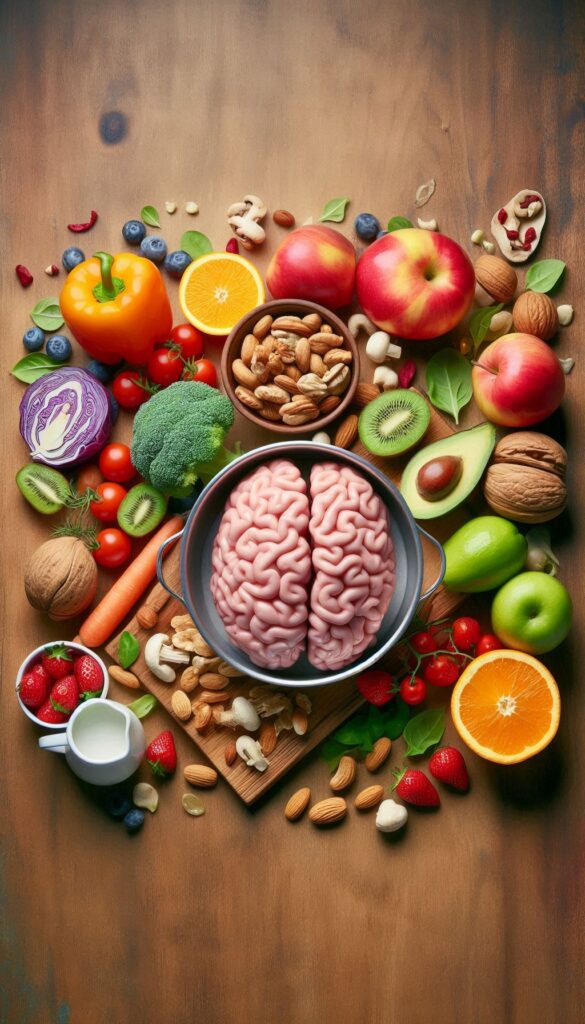Maintaining optimal brain health is crucial for overall well-being and cognitive function. As we age, our brains require special attention to stay sharp, focused, and resilient. The foods we eat play a significant role in supporting brain health, influencing everything from memory to mood and cognitive performance. This comprehensive guide delves into the best foods for brain health, offering insights on how to incorporate them into your diet to promote mental clarity and vitality.
Why Brain Health Matters
1. Cognitive Function
A healthy brain supports various cognitive functions, including memory, learning, and problem-solving. Proper nutrition can enhance these abilities, making it easier to perform daily tasks and tackle new challenges.
2. Mood Regulation
Diet impacts brain chemistry and mood regulation. Certain nutrients can help manage stress, anxiety, and depression, contributing to emotional well-being and mental balance.
3. Neuroprotection
Protecting the brain from damage and disease is essential for long-term cognitive health. Nutrients with antioxidant and anti-inflammatory properties play a key role in safeguarding brain cells from oxidative stress and inflammation.
See price for Oster Air Fryer Oven, 10-in-1 Countertop Toaster, Large Enough for 2 Pizzas, Stainless Steel French Doors, XL Sized https://amzn.to/4bxhPhu
Top Foods for Brain Health
1. Fatty Fish
Benefits: Fatty fish, such as salmon, mackerel, and sardines, are rich in omega-3 fatty acids, particularly EPA and DHA. These essential fats are crucial for brain health as they support:
- Neurogenesis: The creation of new neurons.
- Cognitive Function: Enhancing memory and learning.
- Mood Regulation: Reducing symptoms of depression and anxiety.
Serving Suggestion: Aim to include fatty fish in your diet at least twice a week. Grilled salmon or sardines on a salad are delicious options.
2. Blueberries
Benefits: Blueberries are packed with antioxidants, particularly anthocyanins, which have been shown to:
- Improve Memory: Enhance cognitive function and delay brain aging.
- Protect Neurons: Reduce oxidative stress and inflammation.
Serving Suggestion: Add blueberries to your morning yogurt, oatmeal, or smoothie for a sweet and nutritious boost.
3. Nuts and Seeds
Benefits: Nuts and seeds, such as almonds, walnuts, flaxseeds, and chia seeds, provide a rich source of:
- Vitamin E: Protects against cognitive decline.
- Healthy Fats: Supports brain cell membrane health.
Serving Suggestion: Snack on a handful of mixed nuts or sprinkle flaxseeds over your salads and smoothies.
See price for Campbell’s Condensed Gluten Free Cream of Chicken Soup, 10.5 oz Can https://amzn.to/4d7MZxx
4. Leafy Greens
Benefits: Leafy greens like spinach, kale, and broccoli are high in nutrients such as:
- Vitamin K: Supports brain health by aiding in neuron protection.
- Folate: Important for brain function and mental clarity.
- Antioxidants: Help combat oxidative stress.
Serving Suggestion: Incorporate leafy greens into your meals by adding them to salads, smoothies, or as a side dish.
Benefits: Turmeric contains curcumin, a compound with powerful anti-inflammatory and antioxidant properties. It has been linked to:
- Enhanced Cognitive Function: Improves memory and attention.
- Neuroprotection: Protects against age-related cognitive decline.
Serving Suggestion: Add turmeric to curries, soups, or golden milk for a flavorful way to boost brain health.
6. Dark Chocolate
Benefits: Dark chocolate, particularly those with 70% cocoa or higher, is rich in:
- Flavonoids: Improve blood flow to the brain and support cognitive function.
- Antioxidants: Combat oxidative stress and inflammation.
Serving Suggestion: Enjoy a small piece of dark chocolate as an occasional treat or add cocoa powder to your smoothies.
See price for nutribullet Full-Size Blender Combo 1200W –Matte White https://amzn.to/3L9xyc9
7. Eggs
Benefits: Eggs are a great source of several nutrients beneficial for brain health, including:
- Choline: Essential for brain development and function.
- Vitamin B12: Supports cognitive function and mental clarity.
Serving Suggestion: Include eggs in your breakfast or add them to salads and sandwiches for a protein boost.
8. Oranges
Benefits: Oranges are an excellent source of vitamin C, which is crucial for:
- Neuroprotection: Protects brain cells from oxidative stress.
- Cognitive Function: Supports overall brain health and cognitive performance.
Serving Suggestion: Enjoy a fresh orange or drink a glass of 100% orange juice as part of your daily fruit intake.
9. Whole Grains
Benefits: Whole grains like oats, brown rice, and quinoa are high in:
- Fiber: Regulates blood sugar levels and supports sustained energy.
- B Vitamins: Important for brain health and cognitive function.
Serving Suggestion: Choose whole grains over refined grains and incorporate them into your meals for a nutritious boost.
See price for Cascadian Farm Organic Gluten Free Brownie Crunch Cereal, 12.4 oz. https://amzn.to/3Wc7lQv
10. Avocado
Benefits: Avocados are rich in healthy fats and vitamins that support brain health, including:
- Monounsaturated Fats: Improve blood flow to the brain.
- Vitamin E: Provides antioxidant protection.
Serving Suggestion: Add avocado slices to your salads, sandwiches, or enjoy them on whole-grain toast.
Practical Tips for Incorporating Brain-Boosting Foods
1. Plan Balanced Meals
Create meal plans that include a variety of brain-boosting foods to ensure you’re getting a wide range of nutrients. Incorporate fish, nuts, fruits, and vegetables into your daily meals.
2. Stay Hydrated
Proper hydration is essential for brain function. Drink plenty of water throughout the day and include hydrating foods like cucumbers and melons in your diet.
3. Limit Processed Foods
Minimize the consumption of processed foods high in sugar and unhealthy fats, as they can negatively impact brain health and cognitive function.
See price for Breville Die-Cast Smart Toaster 2 Slice BTA820XL, Brushed Stainless Steel https://amzn.to/4cMlAko
4. Experiment with Recipes
Get creative in the kitchen by experimenting with new recipes that feature brain-boosting ingredients. Try adding spinach to your smoothies, using turmeric in soups, or making a walnut and blueberry salad.
5. Consult with a Professional
If you have specific dietary concerns or health conditions, consider consulting with a registered dietitian or nutritionist to tailor your diet to your individual needs.
Conclusion
Nourishing your brain with the right foods can have a profound impact on cognitive function, mood, and overall health. By incorporating a variety of nutrient-dense foods into your diet, you can support brain health and enhance your quality of life. Remember to focus on a balanced approach, combining these brain-boosting foods with a healthy lifestyle for the best results.
References
- Harvard T.H. Chan School of Public Health. (2022). “Brain Health and Nutrition.” Retrieved from Harvard T.H. Chan
- Journal of Nutrition. (2020). “Dietary Patterns and Cognitive Function: A Review.” Retrieved from Journal of Nutrition
- Frontiers in Aging Neuroscience. (2019). “The Impact of Nutrition on Brain Health and Cognitive Function.” Retrieved from Frontiers
- Mayo Clinic. (2021). “Foods That Boost Brain Health.” Retrieved from Mayo Clinic
By integrating these brain-boosting foods into your daily diet, you can support your mental well-being and enhance cognitive performance, paving the way for a healthier and more vibrant life

